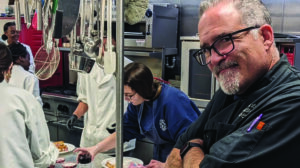By Deb Risden
The September issue of The New Falcon Herald featured the Colorado Public Interest Research Group’s seventh annual report on the state of recycling and composting in Colorado. The article highlighted recycling, the third prong on the three tiers of a more sustainable lifestyle: reduce, reuse and recycle. The CoPIRG report noted Colorado’s record on recycling and composting had not changed over several years, it is still at 16% — half the national average.
CoPIRG pointed out that Colorado is making strides in improving recycling through legislation. The state enacted the Producer Responsibility Program for the Statewide Recycling Act in June 2022. The Act requires producers of paper and packaging products to take responsibility for the end materials by ensuring access to recycling for everyone.
A focus on the three tiers of reduce, reuse and recycle represents the movement from a linear economy (take resources, make products and throw away) to a more sustainable circular economy.
A focus on the three tiers of reduce, reuse and recycle represents the movement from a linear economy (take resources, make products and throw away) to a more sustainable circular economy.
The Ellen MacArthur Foundation defines a circular economy as “a system where materials never become waste and nature is regenerated. In a circular economy, products and materials are kept in circulation through processes like maintenance, reuse, refurbishment, remanufacture, recycling and composting. The circular economy tackles climate change and other global challenges, like biodiversity loss, waste and pollution, by decoupling economic activity from the consumption of finite resources.”
Colorado is making progress in reducing the use of resources.
The CoPIRG report states that eliminating harmful plastics are of the highest priority. The most harmful are the most difficult to recycle. EcoCycle.org states, “One of the most harmful types of plastic packaging is polystyrene (sometimes mistakenly referred to as Styrofoam®), which is made up of multiple styrene molecules. Over 50 chemical byproducts are released during the manufacturing of polystyrene, contaminating the air, water and communities that work in and live near these facilities. Other plastics that are considered toxic for human health and have proven to be less recyclable than other plastics include black plastics, and #3 PVC and #7 PC plastics.”
In 2022, an organization called the U.S. Plastics Pact, with members made up of major brands, nonprofits, local governments and other stakeholders, developed a problematic and unnecessary materials list. Members voluntarily committed to eliminate those items by 2025. Those items included the non-recyclable plastics and unnecessary plastics that cannot be reused, recycled or composted, such as straws and stirrers.
Coloradans are now familiar with the ban on plastic checkout bags, as well as polystyrene foam cups and food containers mandated by the Plastic Pollution Reduction Act.
CoPIRG explains the reason to reduce the use of plastics: “Every type of material has an environmental footprint. Paper bags are very resource intensive to create, requiring the cutting down of trees and high water usage. Plastic bags are made from petroleum and far too often pollute waterways and landscapes where livestock or other animals can fatally ingest them. Polystyrene is one of the most harmful plastics for human health and the environment. These plastics contribute to our microplastics problem as they break apart but do not completely biodegrade. Microplastics build up in our environment and a recent survey of Front Range waterways found microplastics in every surveyed body of water.”
According to the CoPIRG report, some of the progress being made in Colorado is because of new water regulations that help reduce single-use water bottles by ensuring residents have access to potable water. The Bureau of Reclamation is building the Arkansas Valley Conduit, which is a 130-mile pipeline to deliver treated Pueblo water to 39 water systems in the Lower Arkansas Valley, serving about 50,000 residents. The Mobile Home Park Water Quality bill passed; it establishes a water-testing program for mobile home parks, provides funding for water quality remediation and establishes environmental protections for residents.
Some Colorado Mountain towns, such as Breckenridge, Basalt and Avon provide water bottle refill stations in public areas.
Food waste is a contributor to environmental issues. According to Feeding America, “People waste 92 billion pounds of food annually, equal to 145 billion meals. They throw away over $473 billion worth of food annually. Shockingly, they waste 38% of all the food in America.” In Colorado, about 18% of all the landfill materials is food, according to the Colorado Department of Public Health & Environment. The CoPIRG report states, “This represents a huge climate issue, given the resources needed to grow, harvest, transport, and process food as well as the methane gases generated by organic matter in landfills.” The report also states that one in 10 Coloradans cannot afford necessary food, giving additional reason to reduce wasted food, encourage donating edible food and composting non-edible foods.
Moving toward a circular economy has not been all bad for corporations, according to the September NFH article. The sustainability practices lower operating costs and can provide access to new markets. Many corporations across the U.S. and globally have made serious efforts to promote a circular economy with sustainability practices:
- H&M, a clothing retailer, has a garment collection program, commits to using sustainable materials in their clothing, rents clothing and sells refurbished clothing.
- IKEA, a furniture retailer, has a take-back program for used furniture that will be recycled or repurposed; they have a furniture rental program and commit to using sustainable materials.
- Patagonia, a clothing retailer, has a Worn Wear program that will repair damaged clothing and has a trade-in program for used Patagonia clothing. They also commit to using sustainable materials in the manufacture of their clothing and sell a line of clothing made from recycled materials.
- DeWalt, a tool manufacturer, has a recycle and trade-in program for tools.
In September, the U.S. Environmental Protection Agency awarded two Colorado Companies — Revvity and Breckenridge Grand Vacations — the 2024 Regional Pollution Prevention Recognition Program. Revvity, located in Littleton, provides products and technologies to the life-sciences industry. They have implemented process improvements to filtering and purification of primary materials used in manufacturing. Revvity has experienced over 43% reduction in halogenated waste, 70% reduction in solvent waste and 100% reduction in solid hazardous waste.
Breckenridge Grand Vacations is a real estate development and property management company. They modified their snow melt systems by utilizing artificial intelligence weather forecasting to adjust settings based on weather conditions. They are saving 752 metric tons of CO2 and conserved 2003 MMBtus of natural gas each month, resulting in a cost savings of $46,203 per month.






